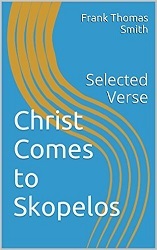Book Review
Christ Comes to Skopelos - Selected Verse

by Frank Thomas Smith
Reviewed by Monique Sanch�z de Mihalitsianos
Christ Comes to Skopelos is a compilation of some of the poetry Frank Thomas Smith wrote in his journeys across the world.
The book starts with the calling and coming of the Christ to Skopelos �several years before his year / Two-thousand�.
This introductory poem serves as the opening of the book and sets the tone for the following initial poems: A tone of reflection and observation. But this observation, which is mostly of people, is far from being morose or melancholic.
Instead, these observations are filled both with empathy and quiet understanding. It�s almost as if the author himself, during these opening poems, was gifted with a sort of encompassing feeling for humankind� reminiscent of the Love, I suppose, the Christ feels for us, for all of humanity.
The opening poems also reveal the existence of karmic bonds between the observer and the observed. The reader is moved through the poetry to contemplate how interrelated we all are with each other as human beings. In one particular poem that struck me (The Second Circle), the author describes his observation of a little beggar boy, and how he was shunned by almost everyone, and the following contemplation of how one day the roles could be reversed and the author himself could be a little beggar boy, and the beggar boy a man who gives him a peso so that he can scrape on by.
The poems, as I mentioned, are mostly people-centered, something that I really enjoyed. I enjoyed, too, the author�s description and contemplation of the divine feminine, and of sensual, physical love, as well as soul-love, of which the author has plenty. Some of these poems tend more towards romantic love and some more towards the physical, but the author�s love is plain in all of them. Honestly, it moved me� captivated me. It�s true.
Regarding the divine feminine, I especially liked the description of the Cosmic Mother impregnating the earth with the scent of her fluids in the beginning of time, embedding in men all around the world the desire for womanhood.
There are also several esoteric poems which I enjoyed, especially the one on Occult Science and the seven planetary epochs, a concise lyric description of the creation and destruction of our worlds. The first time I read it, my heart swelled at seeing Planetary Knowledge so essentially understood and described through the rhythmical power of words.
The author�s knowledge on esoteric matters is also brilliantly weaved through the poems with references to things like karma, reincarnation, and the mythological creation of the cosmos.
I noticed that the poems changed in tone and mood depending on which country they were written in. But one they thing they all have in common is the rhythm of the words�
In this sense, FTS is a master wordsmith. Not because his poems are overly complicated, but because the words all follow each other seamlessly, creating an auditory and sensory rhythm that allows the reader to connect with the thread of meaning behind the words in a powerful and direct way.
The book concludes with a translation from German to English of several poems. I especially liked the translation of Mephistopheles�s conversation with God regarding Faust. These translations are also imbued with life, they don�t even read like translations, but like original material.
All in all a very enjoyable read that I plan to re-visit frequently. Thank you Frank for writing it and for letting me know of its existence. I�m your #1 Fan (for real! Your poetry made me swoon).
Check out the SCR eBook library for a free pdf copy. Or send an email to [email protected] with "ebook" as the subject and "Skopelos"in the body.
Home
